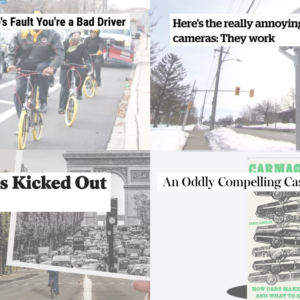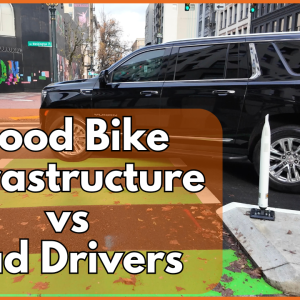“Come on drivers, get your shit together!” That was the text I shared on social media along with a photo of yet another mangled car on Portland’s streets. “The system is deeply flawed/broken/not working,” came a reply from my friend Sarah Risser with Families for Safe Streets PDX. “We should direct our anger at the flawed transportation system.”
Sarah then shared a video about “Safety Science” narrated by advocate and author Jessie Singer where she lays out an argument for why blaming individuals for crashes is a flawed approach to making roads safer.
That’s the exchange that led to the latest episode of the BikePortland Podcast where I sat down with Sarah in The Shed to hash out our difference of opinion on this issue. The conversation ended up in some interesting places and by the end of it I hope you’ll have an even more expansive view of the challenge of Vision Zero and other topics related to road safety. Sarah cares deeply about this topic and is a dedicated safety advocate because she lost her 18-year-old son in a car crash in 2019 (something we talked more about in a previous episode of the pod).
The exchange below gives you a taste of what to expect in this episode:
Jonathan: There’s a portion of extremism going on that throws everything out of whack… We have this extremism because of other systemic factors that are broken down. So now you have this whole block of drivers that will go on Instagram and film themselves burning out and doing dangerous things, like the guy who is doing donuts in a city park. Right? Like two blocks from my house! There’s this level of extremism and that’s what I feel like I’m responding to a lot. Someone has to put on the record that the people are not just going to allow that type of extreme behavior happen, and sit back in our chair and go, ‘Gosh, it’s, it’s not going to be fixed until the system’s better.’ I just can’t live like that. I feel like we need to at least have on the record: ‘We’re pissed and we don’t accept this! You’ve got to be better!’
Sarah: I think that maybe where you and I disagree is you’re directing that at the driver. They’re just doing what the system is letting them do.
Jonathan: But are they? A driver is making a conscious choice to use their car in a way that’s dangerous.
Sarah: It’s kind of like putting me in a room with chocolate and saying you may not have any of that chocolate… we’re just giving drivers this opportunity and we’re reinforcing it over and again.
Jonathan: But at what point would you say we’re not giving drivers that? I mean, like this guy that jumps a couple curbs with his truck and goes into Peninsula Park and starts doing donuts in a city park in broad daylight. That’s a street that’s had a road diet. It’s got 20 mile an hour speed limit, it’s got a concrete separated bike lane, and he literally jumped into a grassy park.
Sarah: Well, those interventions you mentioned are really good, but there are other ones too, right? Like, why do we have cars that can go as fast as they can go? And this is something that families for Safe Streets is really starting to work on, is the intelligent speed assist (ISA). I think that this is another issue that nobody is really talking about: Why do we have vehicles that are so big, that are so dangerous, that can go so fast? Why do we tolerate this? And why do we focus on systems to mitigate around that? And that has always been very frustrating to me.
Listen in the players above, directly on YouTube, or wherever you get your podcasts. I’ve embedded a transcript below:







Thanks for reading.
BikePortland has served this community with independent community journalism since 2005. We rely on subscriptions from readers like you to survive. Your financial support is vital in keeping this valuable resource alive and well.
Please subscribe today to strengthen and expand our work.
The underlying “problem” is not even systemic, but cultural, and deeply linked to the history of the post-WWII boom era. Driving in this country is viewed as a right, not the privilege it should be, and as essential as a house, clothes and food to most people. All the systemic issues follow on the heels of this mindset, and of course individuals are going to take driving for granted and not give it the respect it deserves.
Now that pedestrians have sidewalks and don’t share the street with automobiles, driving is deemed “safe enough” that as a society, we can turn a blind eye on road violence as being acceptable collateral damage so that we can all keep driving. It’s not the fault of the system or the individual, it’s a social pathology.
As a cyclist, driver and chocoholic, I agree with the chocolate analogy
It’s not my fault I ate all the chocolate? Someone please tell my family to stop blaming me!
Great episode!
I have been commuting, recreating and racing my bike in Portland for 30+ years. I sadly hung it up for Zwift and dirt only. Crazy making to hear your guest talk about the lack of enforcement of traffic laws and then discount enforcement (almost in the same breath). To think we will shape behavior without consequences (ie enforcement and the necessary police or tech resources to enforce) is ludicrous. Good luck shaping that behavior by social messaging. Ugh!
Thanks for your comment – and your patience – I agree I came across as inconsistent. Traditional traffic enforcement (cops/troopers pulling people over) has not been shown to be effective at improving overall road safety. The three E’s of road safety (Education, Engineering, and Enforcement) are considered outdated in light of the Safe Systems Approach and even taking an Epidemiological. I don’t think traditional enforcement will improve road safety, because the laws are so inconsistently enforced – so many drivers get away with reckless behaviors without getting pulled over. Speed safety and red light cameras do a great job of consistently giving consequences. However, they only work where they are installed. Drivers can slow down only to speed up again once they are beyond the camera. The low hanging fruit is to hold those drivers who are pulled over or who injure or kill accountable to the fullest extent of the law. Even this isn’t being done. If I came across as ‘discounting enforcement’ it’s because I don’t see how it can consistently hold all reckless drivers accountable. Traditional cops on the streets can’t do this. Cameras can’t either. Hope that helps.